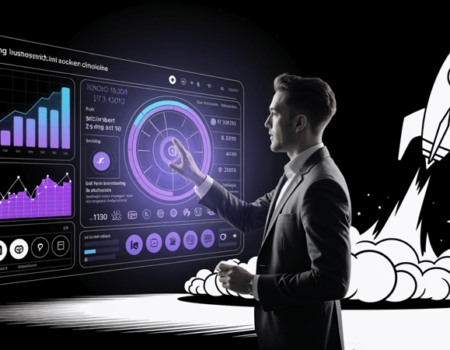Ultimate Guide to Social Media Analytics: Track, Measure & Optimize!
Social media analytics involves collecting and analyzing data from platforms like LinkedIn, Instagram, X (formerly Twitter), and Facebook to evaluate campaign performance and make informed decisions.
These insights help improve audience engagement and drive conversions. Social media analytics tools are invaluable for social media managers, marketing agencies, and media companies. By leveraging these tools, you can track campaign performance, refine marketing strategies, and maximize ROI.
Understanding what content resonates with your audience allows you to optimize your approach, enhance engagement, and achieve better results across your social media efforts.
Why Tracking Social Media Analytics Is Essential
Tracking social media analytics is crucial for marketers looking to enhance their brand’s online presence. By analyzing key metrics, businesses can optimize their strategies, improve engagement, and maximize their return on investment (ROI). Here’s why investing in social media analytics is a smart move.
Gain Deeper Insights Into Performance
Social media analytics provides a detailed view of your campaign’s success, including engagement rates, follower growth, profile impressions, and post reach. By tracking these metrics, you can assess what’s working and refine your approach accordingly. Key performance indicators (KPIs) typically fall into three categories:
- Engagement – Measures interactions such as likes, shares, and comments.
- Awareness – Tracks your reach and potential audience.
- Conversion – Shows which content drives leads and turns followers into customers.
For example, if your goal is to increase your follower count, monitoring engagement metrics like likes and shares can help you understand which content attracts new audiences.
Make Data-Driven Marketing Decisions
Analyzing social media data enables you to identify trends, determine which strategies are effective, and adjust your content accordingly. By tracking metrics in real-time, you can stay ahead of competitors, quickly respond to trends, and minimize risks. Social media analytics helps businesses refine their marketing efforts by showing what resonates most with their audience.
Optimize Your Marketing Strategies
Focusing on relevant social media data ensures that your marketing efforts align with your business objectives. You can improve performance by:
- Clearly defining your campaign goals (e.g., brand awareness, lead generation, or website traffic).
- Tracking key metrics like engagement rate, impressions, and clickthrough rate.
- Understanding audience demographics to create tailored content.
- Comparing past performance with competitor benchmarks to find areas for improvement.
Consistently evaluating analytics allows businesses to fine-tune their strategies and achieve better results.
Understand Your Audience on a Deeper Level
Social media analytics provides insights into your audience’s demographics, behaviors, interests, and preferences. By analyzing data such as age, location, language, and online habits, you can create content that resonates with your target audience.
For instance, if most of your followers are Millennials, prioritizing visually appealing, story-driven content can boost engagement. This data-driven approach enhances brand awareness, uncovers growth opportunities, and strengthens customer relationships.
Demonstrate Your Marketing Impact to Stakeholders
Stakeholders need to see measurable results to validate their investment in social media marketing. Analytics reports allow you to showcase campaign performance, social media-driven revenue, and lead generation.
Using tools, you can create detailed reports to highlight your success and prove the value of your marketing efforts. By leveraging social media analytics, businesses can not only enhance their online presence but also provide tangible results that support long-term growth.
Types of Social Media Analytics
Tracking the right social media analytics is essential for optimizing your marketing campaigns and making informed decisions. These insights help shape data-driven strategies that improve engagement and maximize ROI. Here’s a breakdown of the key types of social media analytics:
1. Tracking Your Own Performance
Analyzing your brand’s social media performance allows you to assess both organic and paid campaigns.
- Organic performance evaluates how well your content performs without paid promotion.
- Paid performance measures the effectiveness of sponsored ads.
Key metrics include impressions, reach, likes, comments, shares, views, clicks, and conversions. By tracking these, you can identify what’s working, optimize your content, and refine your marketing approach.
2. Competitive Analysis
Understanding your competitors’ social media strategies helps you gauge your own performance and uncover growth opportunities. Competitive analysis involves tracking:
- Follower growth and engagement rates.
- Posting frequency and content types.
- Customer sentiment and audience interactions.
By studying your competition, you can refine your strategy, capitalize on their weaknesses, and improve your social media presence.
3. Social Listening
Social listening involves monitoring online conversations about your brand, industry, and competitors. This data-driven approach helps you:
- Identify brand influencers and potential partnerships.
- Improve customer service based on feedback.
- Spot industry trends and consumer interests.
- Monitor competitor activity in real-time.
By actively engaging in social listening, you gain valuable insights that shape your marketing strategies.
4. Sentiment Analysis
Sentiment analysis measures how customers feel about your brand by analyzing their social media interactions. Using AI and natural language processing, it detects emotions behind comments, tweets, and reviews. Benefits include:
- Understanding customer perception.
- Gaining actionable insights for brand improvement.
- Managing reputation effectively.
- Identifying potential PR issues early.
- Tracking competitor sentiment for competitive advantage.
This analytic helps brands respond appropriately to feedback and strengthen their brand image.
5. Influencer Performance
If your brand collaborates with influencers, measuring their effectiveness is essential. Key metrics include:
- Reach and engagement rates.
- Audience demographics and alignment.
- Content performance and conversions.
Tracking influencer analytics helps you:
- Select the right influencers for future campaigns.
- Ensure content resonates with your target audience.
- Optimize influencer partnerships for better ROI.
6. Industry Benchmarking
Industry benchmarking helps you compare your social media performance against competitors and industry standards. Key metrics include:
- Reach and impressions.
- Follower growth and engagement rates.
- Clickthrough rates and post frequency.
By evaluating where you stand within your industry, you can set realistic goals and refine your marketing efforts to stay competitive.
Tracking these social media analytics ensures that every campaign is data-driven, optimized for success, and aligned with your brand’s objectives.
Reporting Social Media Analytics
A social media analytics report provides a detailed overview of your brand’s social media performance, helping you make data-driven decisions. The report’s content depends on the specific insights you need, but it typically includes key performance indicators (KPIs) such as follower demographics, impressions, reach, conversions, and audience growth.
Why Reporting Social Media Analytics Matters
Tracking and reporting social media analytics allows you to:
- Monitor the success of your marketing efforts.
- Understand audience behavior and engagement trends.
- Measure return on investment (ROI).
- Identify areas for improvement and strategy optimization.
For example, if a LinkedIn campaign generates more leads than other platforms, you may choose to invest more resources into LinkedIn or adjust your approach on other social channels.
Key Components of a Social Media Analytics Report
A well-structured social media analytics report should include:
- KPIs Across All Platforms – Track engagement, website traffic, clicks, video views, new followers, reach, and conversions.
- Visual Data Representation – Use graphs, charts, and sections to make insights clear and actionable.
- Executive Summary – Provide a concise overview of the report’s findings and key takeaways.
- Audience Insights – Analyze follower demographics and behaviors.
- Conversion Tracking – Measure the impact of social campaigns on sales and lead generation.
- Recommendations – Suggest improvements and strategy adjustments based on performance data.
Simplifying Social Media Reporting
Managing multiple digital platforms can make reporting overwhelming, but various analytics tools can streamline the process. Popular options include:
- GA4 (Google Analytics 4) – Tracks website traffic, conversions, and user interactions.
- Third-Party Analytics Tools – Platforms like Hootsuite, Sprout Social, and HubSpot offer in-depth reporting and performance tracking.
With the right tools and a well-structured report, you can effectively analyze your social media efforts and optimize your strategies for better results.
Partner with our Digital Marketing Agency
Ask Engage Coders to create a comprehensive and inclusive digital marketing plan that takes your business to new heights.
Contact Us
Conclusion
Tracking and analyzing social media performance is essential for maximizing your brand’s online presence. By leveraging different types of social media analytics—such as competitive analysis, sentiment tracking, and influencer performance—you can make data-driven decisions that improve engagement and ROI. Regular reporting helps you refine your strategy, optimize content, and reach the right audience effectively.
For businesses looking to elevate their social media marketing, Engage Coders provides expert solutions tailored to your goals. From performance tracking to campaign optimization, our team ensures your brand stays ahead of the competition. Partner with Engage Coders today and take your social media strategy to the next level. Request a free quote here!







